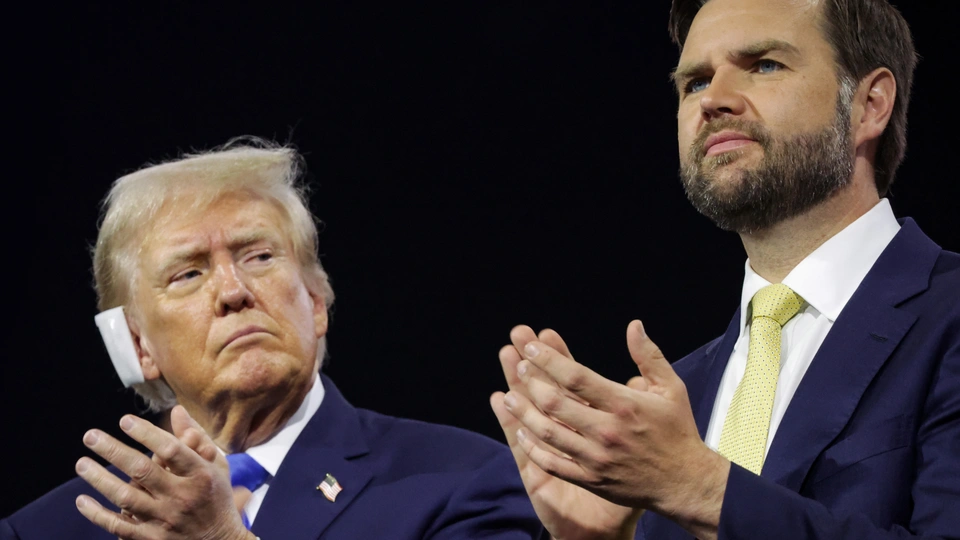On the debate stage, JD Vance pulled off a miracle: He made Trumpism sound polished, polite, and coherent. He delivered his lines with a glossy veneer that concealed their inanity. You could catch yourself believing him for a split second—that is, until you take a peek into his past. Vance is a master con artist who got to where he is through constant, shameless reinvention.
Just a few years ago, Vance was one of the GOP’s most acerbic critics of Donald Trump, and his extensive Trump-bashing record has since come to light. In 2016, he tweeted, “Trump makes people I care about afraid. Immigrants, Muslims, etc. Because of this I find him reprehensible.” He has also called Trump “cultural heroin” and a “moral disaster,” and professed that he would never vote for him. Vance’s backbone was admirable in a party all too eager to genuflect before Trump. Yet, somehow, the very same Vance who once called Trump “America’s Hitler” ended up as his right-hand man.
In order to play the part of Trump’s perfect sycophant, Vance has debuted version after version of himself, scrapping his old positions and even his old self. But none of them hold any water.
Vance has transformed himself into a champion of Trump’s right-wing populism. During the debate, he rolled out a conveniently abbreviated biography, painting a picture of a poor kid in Appalachia whose family struggled with poverty and addiction. There was no mention of his Ivy League education, wealth, or ties to Silicon Valley titan Peter Thiel. Instead, he reinvented himself as a “hillbilly” and a dedicated servant of the downtrodden and dispossessed. He is, however, emblematic of the same establishment elite that he claims to loathe.
Even though he has done his very best to rewrite his story, Vance is a Yale-educated lawyer, which should in theory suggest some level of reverence for the law. In recent months, however, he has ramped up the 2020 election denial, nursing Trump’s old wounds and promising not to betray him like Mike Pence did. Vance said that if he had been in Pence’s position, he would have “asked the states to submit alternative slates of electors.” During the debate, he doubled down, insisting that Trump “peacefully gave over power on January 20.” Vance may be smooth and feign decency in a way Trump never manages to, but when power is on the line, he is just as unscrupulous and morally depraved as his boss.
He is shamelessly opportunistic, always willing to swallow his convictions and recast himself for a promotion. Case in point: his scramble to reconcile Trump’s abortion policy with his own past statements. A mere two years ago, Vance announced that he “would like abortion to be illegal nationally,” without exceptions for rape and incest. “Two wrongs don’t make a right,” he said. But on the debate stage, he backpedaled furiously, or at least tried to. He stressed the need for “options” and spoke almost empathetically of an old friend who had an abortion. And, no, what he actually wanted back in 2022 was a “minimum national standard.” It seems abortion is not all that sacred for JD Vance after all. What is in the neverending pursuit of power?
As confidently as he now touts Trump’s hard-line policies, Vance is far from the picture of integrity or conviction. Who’s to say that he won’t reinvent himself before the election or, God forbid, mid-vice presidency?
If a crisis erupts—or if there’s a strong gust of wind—Vance’s contrived persona could easily collapse, leaving Trump’s campaign or presidency in shambles.
One need only look at how quickly Trump excommunicated dissidents from his first term. On January 6, 2021, he was ready to toss Mike Pence to the gallows. Nearly everyone who worked with Trump the first time around—from Rex Tillerson to John Bolton—is now persona non grata.
Trump, ever the egoist, has little tolerance for dissent. For him, the presidency is less political than it is personal. He sees politics through the prism of loyalty and power, not policy. Those who do not fall in line and acquiesce get the boot—hence Pence’s fall from grace. However, while Pence’s squabble with Trump unfolded at the very end of his term, Vance may have four years ahead to slip up.
We have already begun to see their partnership fray—a quite swift end to their honeymoon phase. Before the debate, they spent months contradicting each other on abortion. Vance pledged on national television that the former president would veto a national abortion ban, but Trump, visibly miffed, later denied the claim. They’re rarely in sync, in fact. What they do share, however, is a thirst for power.
Vance, with his chameleon-like tendencies, is unburdened by principle. Instead, his opportunism highlights his laser focus on having as much power as possible—which happens to be the very same mentality that Trump operates under, rather unfortunately for both of them. A Trump administration has room for only one megalomaniac, after all.
But still, why JD Vance? Why choose the potential rebel when there was no shortage of groveling Republicans chomping at the bit? Perhaps Trump derived some egotistical satisfaction from turning one of his most bitter critics into his toady. After all, Vance is not the only shape-shifter that has become a close confidant. Senator Lindsey Graham, a fierce Trump loyalist, once called Trump a “race-baiting, xenophobic, religious bigot.” Former Democratic presidential candidates Tulsi Gabbard and Robert Kennedy Jr. have recently cozied up to Trump too.
Opportunists with hollow convictions may be the easiest to manipulate. But with malleability comes volatility. Vance’s fundamental unpredictability indicates a lack of loyalty to one ideology, cause, or—most crucial here—person.
Featured Image Source: The Atlantic






Comments are closed.